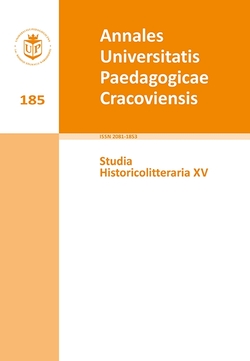Ernsta Jüngera obraz wojny
Main Article Content
Abstract
War described by Ernst Jünger
World War I (1914-1918) was one of two wars in Europe which Germany sought. One of the participants of the war was a German soldier and writer Ernst Jünger, who described his experiences in Storm of Steel (In Stahlgewittern). His diaries are a valuable source of knowledge of the Great War. Sincere confessions of a German soldier who during the war was promoted through the ranks is also a story of a daily life on the front of both Jünger and the subordinates of the German Emperor - Wilhelm II. The diary holds a special place among books about war due to their origins - written by a German fluent in French and passionate about French literature and culture. Jünger’s dairy was translated into Polish by a soldier Janusz Gaładyk and given the title Książe piechoty. Through such a title, Gaładyk paid his respects to the German comrade. The book has a didactic character because it shows the multidimensionality of the atmosphere in the German army.
Key words: France; Germany; nationalism; patriotism; I World War;
Downloads
Article Details

This work is licensed under a Creative Commons Attribution-NonCommercial-NoDerivatives 4.0 International License.
COPYRIGHT POLICY
The publisher of "Annales Universitatis Paedagogicae Cracoviensis.Studia Historicolitteraria" is authorised to use and distribute all the materials published in the journal on the basis of a non-exclusive licence agreement unlimited in time – previously concluded for an indefinite period of time each time with the author of a specific paper in the fields of exploitation specified in the agreement.
OPEN ACCESS POLICY
"Annales Universitatis Paedagogicae Cracoviensis.Studia Historicolitteraria” is an open access journal, and all its contents are available for free to users and/or their institutions on the basis of non-exclusive licenses under Creative Commons (CC BY CC-BY-4.0). Users can read, download, make copies, distribute, print, search, or to link to full text articles in this journal without the prior permission of the publisher or the author.This is consistent with the definition of open access BOAI (http://www.soros.org/openaccess).
References
Ernest Jünger, „Wikipedia”, www.fr.wikipedia.org/wiki/Ernst_Jünger [dostęp 9.10.2014].
Gide A., Dziennik, Paryż 1926.
Hernicz R. (Haber), Z pamiętnika żołnierza Wielkiej Wojny. Nowele i szkice, Cieszyn 1915.
I wojna światowa, „Wikipedia”, www.pl.wikipedia.org/wiki/Iwojna_swiatowa [dostęp 9.10.2014].
Jünger E., Książę Piechoty, przeł. J. Gałdyk, Warszawa 1935.
Jünger E., Na marmurowych skałach, przeł. W. Kunicki, Warszawa 1997.
Kunicki W., Polechoński K., Ernst Jünger w publicystyce i literaturze polskiej lat 1930–1998.
Studium recepcyjne, Wrocław 1999.
Lagarde F., de Towarnicki F., Sagnes N., Walter G., Hervier J., Palmier J. M., Saatdjan D., Brouder L., Ernst Jünger dokument,,,Magazyn Literacki” 1994, nr 326.
Miguel P., W czasach pierwszej wojny światowej, przeł. Ł. Częścik, Wrocław 1996.
Milewska W., Nowak J. T., Zientara M., Legiony polskie 1914–1918, Kraków 1998.
Nietzsche F., Tako rzecze Zaratustra, przeł. W. Berent, Poznań 1995.
Nietzsche F., Wola mocy, przeł. K. Drzewiecki, S. Frycz, Kraków 2009.
Orkan W., Drogą Czwartaków i inne wspomnienia wojenne, Kraków 1972.
Remarque E. M., Na Zachodzie bez zmian, przeł. R. Wojnakowski, Poznań 2010.
Szelągowska K., Wykłady z historii powszechnej dla szkoły średniej, Warszawa 1994.
Who’s Who – Kaiser Wilhelm II „Firstworldwar.com” www.firstworldwar.com/bio/Wilhelm.htm [dostęp: 9.10.2014].
Wilhelm II German Emperor, „Wikipedia”, www.en.wikipedia.org/wiki/Wilhelm_II_German_Emperor [dostęp: 9.10.2014].
World War I, „Wikipedia”, www.en.wikipedia.org/wiki/World_War_I [dostęp: 9.10.2014].
